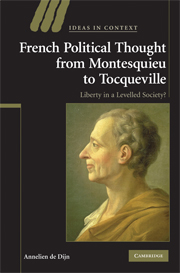Book contents
- Frontmatter
- Contents
- Acknowledgements
- Introduction
- 1 Political thought in eighteenth-century France: the invention of aristocratic liberalism
- 2 Liberty and inequality: the royalist discourse
- 3 A society of equals: the liberal response
- 4 Liberty in a levelled society: Charles Dunoyer, Benjamin Constant, and Prosper de Barante
- 5 The new aristocracy: a theme in Restoration liberalism
- 6 The danger of democracy: Orléanist liberalism and Alexis de Tocqueville
- 7 The French predicament: aristocratic liberalism in the Second Empire
- Epilogue
- Bibliography
- Index
- IDEAS IN CONTEXT
4 - Liberty in a levelled society: Charles Dunoyer, Benjamin Constant, and Prosper de Barante
Published online by Cambridge University Press: 22 September 2009
- Frontmatter
- Contents
- Acknowledgements
- Introduction
- 1 Political thought in eighteenth-century France: the invention of aristocratic liberalism
- 2 Liberty and inequality: the royalist discourse
- 3 A society of equals: the liberal response
- 4 Liberty in a levelled society: Charles Dunoyer, Benjamin Constant, and Prosper de Barante
- 5 The new aristocracy: a theme in Restoration liberalism
- 6 The danger of democracy: Orléanist liberalism and Alexis de Tocqueville
- 7 The French predicament: aristocratic liberalism in the Second Empire
- Epilogue
- Bibliography
- Index
- IDEAS IN CONTEXT
Summary
Restoration liberals did not just criticize the royalists' aristocratic liberalism. They also made a more positive contribution to the post-revolutionary debate. If both Jacobinism and the royalists' aristocratic liberalism were anachronistic ways to preserve liberty in the levelled society of post-revolutionary France, alternative political models needed to be sought. In the response to that challenge, the internal division of Restoration liberalism became clear. For liberals did not formulate one but several alternatives to the political doctrines of their opponents, which were not necessarily compatible.
LAISSEZ-FAIRE LIBERALISM: CHARLES DUNOYER
An important contribution to the development of a liberal alternative to the royalists' aristocratic liberalism was made by a group of publicists and political thinkers known as the ‘industrialists’. They propagated a theory of social change, which, as we have seen, conceived of the history of France as a transformation from a military, war-based economy, in which a dominant class lived off the produce of the majority of the citizens, to an industrial society, in which all citizens were engaged in productive labour. This social transformation, industrialists preached, should be followed by a political transformation that would create a state more in accordance with the needs of the new industrial society. As a group, however, the industrialists were far from agreeing on the political implications of these presuppositions.
- Type
- Chapter
- Information
- French Political Thought from Montesquieu to TocquevilleLiberty in a Levelled Society?, pp. 89 - 110Publisher: Cambridge University PressPrint publication year: 2008
- 1
- Cited by



